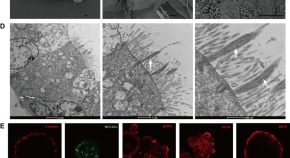MSCs alleviate LPS-induced acute lung injury by inhibiting the proinflammatory function of macrophages in mouse lung organoid–macrophage model
Authors (first, second and last of 11)

Collection
Discover the groundbreaking world of organoids, the cutting-edge frontier in cell culture and tissue engineering. Organoids are miniaturized, three-dimensional models derived from stem cells, mimicking the structural and functional features of organs. These remarkable structures offer a revolutionary platform for biomedical research, drug development, and personalized medicine. By replicating the complex cellular interactions found in real organs, scientists can study diseases with unprecedented accuracy and efficiency. Organoids hold the promise of transforming how we understand human biology and disease progression, leading to more targeted therapies. This exciting field continues to push the boundaries of science, unlocking new avenues for medical advancements and improved patient care.
This collection supports United Nations Sustainable Development Goals 3: Good Health & Well-BeingDr. Morizane is a Principal Investigator at Massachusetts General Hospital and an Associate Professor at Harvard Medical School. He directs research groups with a specific focus on kidney regenerative medicine, genome editing, organ-on-a-chip technology, and kidney disease modeling. His work is internationally acclaimed, earning him prestigious awards, including the NIH Director's New Innovator Award. His unwavering dedication to translational research has resulted in the creation of human cell-based models for kidney organoids and organoid-on-a-chip, contributing to studies of chronic kidney disease and polycystic kidney disease.
Mart Lamers is an Assistant Professor at Duke-NUS Medical School in the Programme of Emerging Infectious Diseases. He completed his PhD at the Erasmus MC in the group of Prof. Bart Haagmans on the topic of coronavirus pathogenesis and evolution. Mart uses organoid technology to accurately model host cells and their interactions with viruses. He is particularly interested in coronavirus pathogenesis and aims to improve pandemic preparedness through his research.
